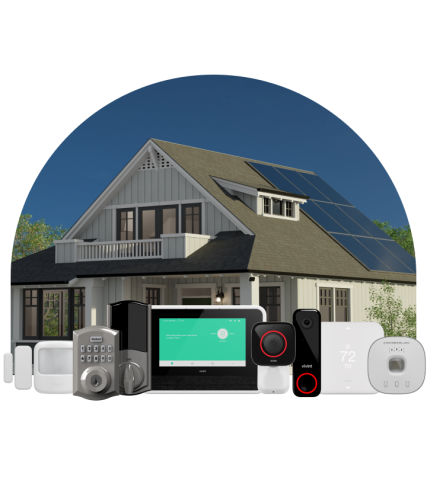
solar plans
Go solar with Vivint
Own your own power and enjoy potential savings on utilities.
smart energy financing
Solar plans and packages for every budget
Get power independence with a Vivint solar energy system that’s customized for
your unique home and needs.
Solar Loan
Purchase and finance your system
Solar PPA/Lease
Pay a fixed rate per kWh
Solar Cash Purchase
Own your system outright
Go solar and save. Find out how.
To ensure a smooth experience, have your electric bill on hand.

How much does it cost to go solar?
Get an estimate in minutes
Add some basic information to our solar calculator, like your location and current energy usage, and we’ll provide a customized estimate for powering your home with solar energy.
Frequently Asked Questions
How do you plan a solar power system?
Customizing your own solar system depends in large part on the amount of energy needed to power your home, the configuration of your home, the size and shape of your roof, and even where you live.
The basic components of a solar energy system comprise
- Solar panels: They produce the electricity.
- Inverters: They convert DC energy from your panels into the AC energy your home needs.
- Electrical panel: The power then goes to the electrical panel, which powers your home.
- Electricity meter: Extra electricity is measured by a meter and goes back to the grid.
- Battery backup: Save electricity for a rainy day or to compensate for grid issues.
Many companies offer online tools to help you configure a system. But at Vivint our specialists are ready to assists you in customizing a system that fits your power needs and your unique home. They know what questions to ask, what panels work best for your home, and how much backup battery is required to ensure you always have the power you require no matter what’s happening with the grid.
How much do solar panels cost?
The cost of solar panels depends on the size of your home and how much energy you need to generate. Speak to a Vivint specialist and provide basic information about your home and energy usage to get a free quote. Vivint provides financing options to make it more cost-effective to transition to solar.
How many solar panels do I need?
The number of solar panels you need depends on the size of your roof and how much energy you need to generate. Speak to a Vivint solar specialist to get an estimate on the number of solar panels your house requires.
What is a production guarantee?
You count on your solar energy system to power your home, reduce your dependence on the grid, and potentially lower your utility payment each month. A *solar production guarantee protects your solar investment, like an insurance policy for your solar panels. It guarantees that your solar panels will meet a certain percentage of output and covers you if they don’t.
*Work with your installer to find out which guarantees are available to you.
What are the main advantages of solar energy?
You’ll find multiple benefits and advantages to going solar:
- Stable prices: Although renewable solar energy can require an upfront investment, ultimately you have the potential to save on your monthly utility spend with stable energy pricing going forward. And given that solar pricing has dropped in recent years and is expected to continue declining, the cost of switching to solar and the potential savings are a huge draw.
- Reliable: You’re much less likely to experience a blackout or power failure when you go solar. Solar energy is less likely to experiencer large-scale failure because it’s distributed—a distributed system is spread out over a large geographical area, so a weather event in one location won’t cut off power to an entire region. And when you customize a system with backup-battery storage, you’ll have power regardless of what’s happening with the grid.
-
Renewable and more: Clean, renewable energy isn’t going anywhere—it’s inexhaustible, so it’s always available and “free.”
- It’s nontoxic and doesn’t emit pollutants.
- It reduces use of fossil fuels.
- It’s becoming more competitive as prices continue to drop.
- It’s a measure against climate change as it reduces emission.
- It generates employment opportunities.
Speak to a Vivint professional to learn about how solar can impact your ability to power your home and its potential impact on your wallet.
How many solar batteries are needed to power a house?
This can depend on energy usage in the home, what the homeowner wants to power, and for how long. Considering that the average solar battery is roughly 10 kilowatt-hours (kWh) in size:
- To maximize savings, 2-3 batteries may be enough battery storage to cover your energy usage when your solar panels aren’t producing.
- If you just want backup power when the grid is down, one solar battery should be enough.
- In order to go off-grid completely, you will need much higher storage capacity, which may mean 8-12 solar batteries.
A Vivint smart energy expert can help you identify the right number of batteries for your home, needs, and budget.